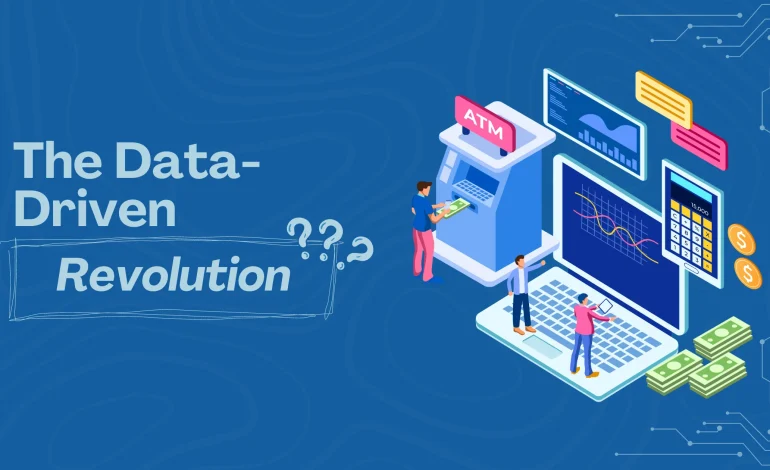
The Data-Driven Revolution: How Businesses Can Leverage Big Data for Growth
Table of Contents
In today’s digital age, data has become the new oil. Just as oil fueled the industrial revolution, data is fueling a revolution in business strategy. This “data-driven revolution” empowers organizations to make informed decisions, optimize operations, and achieve sustainable growth. At the heart of this revolution lies the concept of big data.
Unveiling the Power of Big Data
Big data refers to the vast and complex datasets generated by modern businesses. This data encompasses everything from customer transactions and social media interactions to sensor data from connected devices and website analytics. The sheer volume, velocity, and variety of big data can be overwhelming, but within it lies a treasure trove of insights waiting to be unearthed.
Here’s where data analytics comes in. Data analytics is the process of collecting, cleaning, analyzing, and interpreting big data to extract meaningful patterns and trends. By harnessing the power of data analytics, businesses can:
- Gain a Deeper Understanding of Customers: Analyze customer behavior patterns, preferences, and purchase history to personalize marketing campaigns, develop targeted promotions, and predict future buying trends.
- Optimize Business Operations: Identify areas for improvement in processes, resource allocation, and supply chain management. Data analytics can help streamline operations, increase efficiency, and reduce costs.
- Mitigate Risk and Fraud: Analyze financial data and customer activity to identify potential risks and fraudulent transactions proactively.
- Develop Data-Driven Products and Services: Leverage customer insights to develop innovative products and services that cater to evolving customer needs.
- Make Informed Business Decisions: Move beyond guesswork and intuition by grounding business decisions in data-driven insights.
Data Analytics in Action: Optimizing Business Operations

Data analytics plays a crucial role in optimizing various aspects of business operations:
- Marketing and Sales: Analyze customer demographics, buying behavior, and marketing campaign performance to optimize targeting, personalize messaging, and maximize return on investment (ROI).
- Supply Chain Management: Gain real-time insights into inventory levels, demand forecasting, and supplier performance. This allows for efficient inventory management, optimized logistics, and reduced stockouts.
- Human Resources: Analyze employee performance data, identify skill gaps, and tailor training programs to optimize workforce performance and talent management.
Data analytics empowers businesses to move beyond reactive decision-making and adopt a proactive, data-driven approach to optimization across all operational areas.
Building a Data-Driven Culture: Essential Steps for Success
While the potential of big data and data analytics is undeniable, successfully leveraging them requires a cultural shift within organizations. Here are some key steps to build a data-driven culture:
- Invest in Data Infrastructure: Invest in technology solutions that facilitate data collection, storage, and analysis. This could include cloud computing platforms, data warehouses, and data visualization tools.
- Develop Data Literacy: Train employees across all levels of the organization to understand the importance of data, interpret data visualizations, and translate insights into actionable business strategies.
- Foster a Data-Driven Mindset: Encourage a culture of data-driven decision-making where data is valued as a strategic asset, and insights are actively sought to inform actions.
- Embrace Data Governance: Implement data governance frameworks that define data ownership, access controls, and data quality standards.
By fostering a data-driven culture, organizations can position themselves to leverage big data effectively and reap the rewards of a data-driven revolution.
Challenges and Considerations in the Data-Driven Revolution

The data-driven revolution is not without its challenges. Here are some key considerations:
- Data Security and Privacy: Protecting customer data and ensuring compliance with data privacy regulations is paramount. Businesses need robust security measures and clear data governance policies.
- Data Quality: Data quality is critical for accurate analysis. Businesses need to implement data cleansing processes and ensure the integrity of their data sets.
- Talent Acquisition: Finding and retaining skilled data scientists and analysts is crucial for success. Businesses need to invest in talent development programs to bridge the data skills gap.
Addressing these challenges is essential for businesses to navigate the data-driven revolution responsibly and effectively.
The Future of Big Data and Data Analytics: A World of Possibilities
The future of big data and data analytics is brimming with possibilities. Here are some emerging trends to watch:
- Artificial Intelligence (AI) and Machine Learning (ML): AI and ML will play an increasingly prominent role in data analysis, enabling businesses to automate tasks, identify complex patterns, and make more sophisticated predictions.
- The Internet of Things (IoT): As more devices become connected, the volume and variety of data will continue to explode. Businesses will need to develop strategies to analyze and extract value from this ever-growing data stream.
Real-Time Analytics: Businesses will gain the ability to analyze data in real





